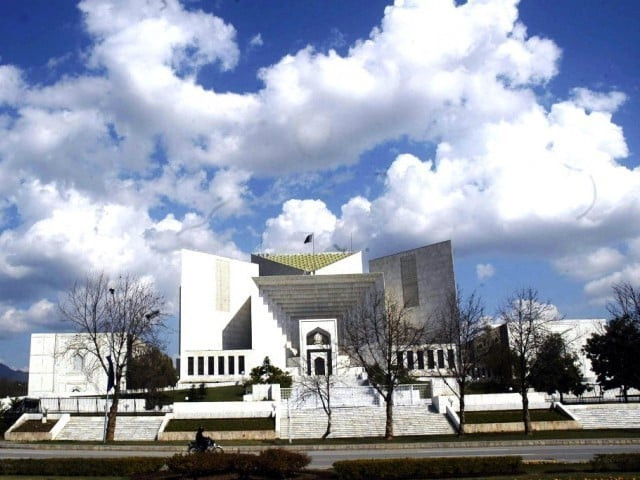Relief for the poor: Supreme Court asks govt to stop bulldozing of katchi abadis
Seeks statements from federation, law, cabinet secretaries, CDA, police, commissioner

Supreme Court. PHOTO: EXPRESS/FILE
The country’s top court on Wednesday stopped the government agencies from demolishing informal settlements or slums in the federal capital.
A three-judge bench of the Supreme Court headed by Chief Justice (CJ) Jawwad S Khawaja sought concise statements from the federation, Capital Development Authority (CDA), federal law secretary, Islamabad IGP, cabinet secretary and chief commissioner.
The bench issued these directives on a constitutional petition filed by the affected dwellers of the I-11 katchi abadi razed to ground earlier this month, and the Awami Workers Party (AWP).
The bench declared the petition maintainable as they have raised matters of public importance.
The petitioners urged the court to declare that residents of capital’s katchi abadis are entitled to the benefits conferred under articles 9 (right to living), 10-A (fair trial) and 25 (equal opportunity to all) of the Constitution.

The petitioners contended that the state was duty bound to provide shelter and other amenities to residents per the constitution and the National Housing Policy 2001. They requested the court to direct the state to stop the forcible eviction of slum residents.
The top court also directed the CDA and chief commissioner to submit a report regarding the total number of katchi abadis, those which have been regularised and demolished.
It also asked CDA to submit a policy for providing shelter to low-income citizens.
The court also sought reports from all provinces regarding their policies, if any, for provision of housing to citizens.
Furthermore, the SC ordered the capital police to submit a record of each police station’s daily diary (roznamcha) related to the issue of katchi abadis.
The CJ made it clear that judges have no ideology as they look at things through the lens of the Constitution. He also referred the court’s order in agro farms case wherein then attorney general had been asked if the government was legalising constructing of buildings at agro farms in violation of the master plan, then it [government] should do the same for slums as well.
“I want to ask CDA how this encroachment is different from others,” the CJ questioned. The court also questioned why the authorities asked property owners not to rent their houses to the evicted I-11 dwellers?
The bench also hinted at the appointment of noted town planner Tasneem Siddiqui as amicus curiae, who have done seminal work on the issue of katchi abadis in Karachi.
During the hearing, veteran constitutional lawyer Abid Hassan Minto who appeared on behalf of the petitioners, said the demolishing of houses in I-11 was in violation of the constitution as most residents were workers and living there for the last 20 to 40 years.
The counsel requested the court to direct the state to stop the forcible eviction.
The counsel also contended that a number of state institutions have encroached upon state land but CDA did not take action against them.
Additional attorney general, counsels for CDA and chief commissioner sought time to file a reply. The court adjourned the hearing till Monday.
Published in The Express Tribune, August 27th, 2015.



















COMMENTS
Comments are moderated and generally will be posted if they are on-topic and not abusive.
For more information, please see our Comments FAQ